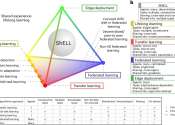Colorado law protects brain data captured by gadgets
Colorado on Wednesday expanded its privacy law to include brain data gathered by the booming array of gadgets people use for feedback about sleep, fitness, sports, and lifestyle.
14 hours ago
0
13
Security

Colorado on Wednesday expanded its privacy law to include brain data gathered by the booming array of gadgets people use for feedback about sleep, fitness, sports, and lifestyle.
14 hours ago
0
13
Business

A class-action lawsuit filed in North Carolina accuses Atrium Health of allowing Facebook and Google to access patient information online to use in targeted ads.
Apr 16, 2024
0
14
Energy & Green Tech

The U.S. power grid is the largest and most complex machine ever built. It's also aging and under increasing stress from climate-driven disasters such as wildfires, hurricanes and heat waves.
Apr 15, 2024
0
3
Robotics

Researchers at Meta AI, Stanford University, Technische, Universität Dresden and the German Cancer Research Center (DFKZ) recently developed DIGIT Pinki, a miniature-sized sensor that can detect tactile information. This ...
Energy & Green Tech

A lot of energy is required to analyze and store large amounts of data. We may therefore have to take a different approach to data storage in the future, so says Professor Søren Brunak at the University of Copenhagen.
Apr 2, 2024
0
1
Engineering

In intelligent sensing fields such as radar, machine vision and medical imaging, the critical information used for decision-making is often sparse. For example, a monosyllabic waveform requires thousands of sampling points, ...
Apr 2, 2024
0
1
Electronics & Semiconductors

A new electrical power converter design achieves a much higher efficiency at lower cost and maintenance than before. The direct current voltage boost converter developed by Kobe University is poised to be a significant contribution ...
Apr 1, 2024
0
134
Business

Amazon will soon offer same-day delivery of several prescription medications in Los Angeles and New York, yet another example of the online shopping giant's bet on consumers' growing dependence on ease and speed.
Mar 27, 2024
0
6
Electronics & Semiconductors

Researchers from the RIKEN Center for Emergent Matter Science and collaborators have developed an organic photovoltaic film that is both waterproof and flexible, allowing a solar cell to be put onto clothes and still function ...
Mar 27, 2024
0
26
Computer Sciences

Leading computer scientists from around the world have shared their vision for the future of artificial intelligence—and it resembles the capabilities of Star Trek character "The Borg."
Mar 22, 2024
7
643
A drug, broadly speaking, is any substance that, when absorbed into the body of a living organism, alters normal bodily function. There is no single, precise definition, as there are different meanings in drug control law, government regulations, medicine, and colloquial usage.
In pharmacology, a drug is "a chemical substance used in the treatment, cure, prevention, or diagnosis of disease or used to otherwise enhance physical or mental well-being." Drugs may be prescribed for a limited duration, or on a regular basis for chronic disorders.
Recreational drugs are chemical substances that affect the central nervous system, such as opioids or hallucinogens. They may be used for perceived beneficial effects on perception, consciousness, personality, and behavior. Some drugs can cause addiction and/or habituation.
Drugs are usually distinguished from endogenous biochemicals by being introduced from outside the organism.[citation needed] For example, insulin is a hormone that is synthesized in the body; it is called a hormone when it is synthesized by the pancreas inside the body, but if it is introduced into the body from outside, it is called a drug.[citation needed] Many natural substances, such as beers, wines, and psychoactive mushrooms, blur the line between food and recreational drugs, as when ingested they affect the functioning of both mind and body and some substances normally considered drugs such as DMT (Dimethyltryptamine) are actually produced by the human body in trace amounts.
This text uses material from Wikipedia, licensed under CC BY-SA